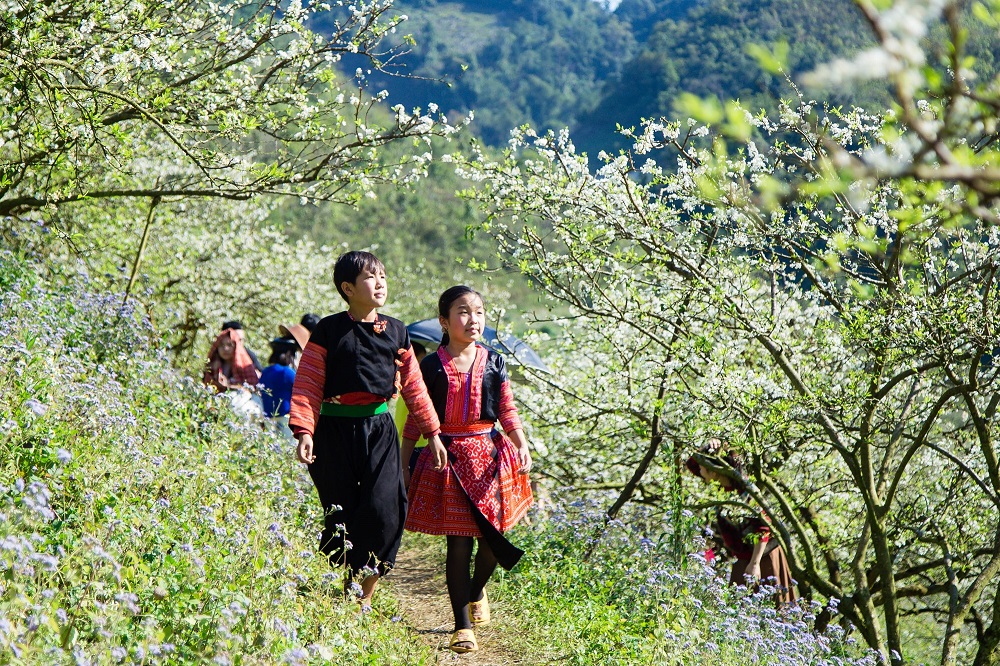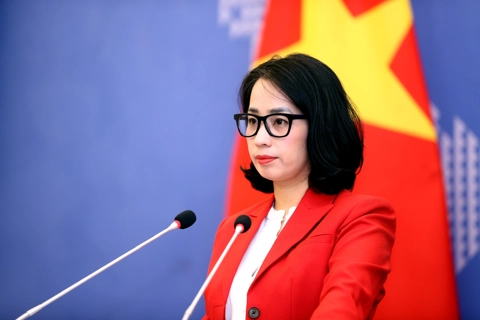UNDP announces new country program worth US$121M for Vietnam
The next five-year program focuses largely on sustainable economic transformation, climate resilience, and better governance.
UNDP Executive Board has approved the new country program document (CPD) worth US$121 million for Vietnam for the 2022-2026 period.
| Part of UNDP country program for Vietnam in 2022-2026 is climate resilience. Photo: Duy Khanh/ The Hanoi Times |
The CPD aims to support the government in accelerating the achievement of the UN Sustainable Development Goals (SDGs), guided by the UNDP Strategic Plan’s three outcomes, including Shared prosperity through sustainable economic transformation; Climate change, disaster resilience and environmental sustainability; and Governance and access to justice.
In this context and based on the Independent Country Program Evaluation (ICPE) for the 2017-2021 period, UNDP will provide thought leadership on issues core to the achievement of the SDGs, Paris Agreement and human development.
It’s based on a jointly developed theory of change underpinning the United Nations Sustainable Development Cooperation Framework (UNSDCF), which contributes to Vietnam’s Socio-Economic Development Strategy (2021-2030) and Socio-Economic Development Plan (2021-2025).
“Vietnam stands at a critical juncture as it seeks to rebound from Covid-19 in ways that generate growth, are job-rich, sustainable and inclusive,” said UNDP Resident Representative in Vietnam Caitlin Wiesen. “With UNDP’s new 5- year Country Program, we deepen our partnership with Vietnam to eradicate persistent poverty and develop pathways that deliver net zero carbon emissions and the Sustainable Development Goals.”
She said with the CPD, UNDP will foster innovation and shift ecosystems to scale implementation of the SDGs thanks to the partnership with different stakeholders to accelerate green inclusive transformations that empower the most vulnerable through greater opportunity and resilience.
The CPD is expected to contribute to and benefit from a more sustainable, inclusive and gender-responsive economic transformation; safer and cleaner environment; and a more just, safe, and inclusive society by 2026.
UNDP’s continued support
Toward shared prosperity through sustainable economic transformation, UNDP will help ensure that people in Vietnam, especially those at risk of being left behind, will contribute to, and benefit equitably from a more sustainable, inclusive and gender-responsive economic transformation based on innovation, entrepreneurship, enhanced productivity, competitiveness, and decent work.
UNDP will support Vietnam with next-generation mechanisms to enable vulnerable groups, in particular poor people, ethnic minority women and people with disability, to create and access sustainable jobs and improved livelihoods; evidence-based policy options for sustainable, inclusive and gender-responsive economic transformation agenda and its financing; and inclusive, gender-responsive and shock-responsive social protection systems expanded.
For climate change, disaster resilience, and environmental sustainability, the program will enable people in Vietnam, especially those at risk of being left behind, to benefit from and contribute to a safer and cleaner environment resulting from Vietnam’s effective mitigation and adaptation to climate change; disaster risk reduction and resilience building; promotion of circular economy; provision of clean and renewable energy; and sustainable management of natural resources.
UNDP will support innovative and resilience-building solutions introduced to reduce risks from disasters and climate change and health impacts for vulnerable people; policies and solutions designed and implemented for transformation to low-carbon development, circular economy, and environmental protection; and gender-responsive, sustainable, and innovative solutions and practices in natural resources, biodiversity conservation and nature-based tourism adopted.
In the governance and access to justice area, the program will help enable people in Vietnam, especially those at risk of being left behind, to benefit from and contribute to a more just, safe, and inclusive society based on improved governance, more responsive institutions, strengthened rule of law and the protection of and respect for human rights, gender equality and freedom from all forms of violence and discrimination in line with Vietnam’s international commitments
Rule of law institutions and systems will be strengthened, and the implementation of laws will be monitored to expand access to justice and freedom from discrimination, with a focus on vulnerable groups. Mechanisms for promoting transparency will be improved, alongside public participation, integrity, adaptability, and accountability, including the participation of women and other vulnerable groups.
UNDP will support gender-responsive, risk-informed, and anticipatory capacities to improve human security, respond to future crises and sustain peace; and strengthen capacities strengthened to undertake legal, policy, and institutional reforms to address structural barriers to gender equality and inclusion of persons with disability.
Building on the previous program, UNDP will support the government with capacities for anticipatory, adaptive, and agile (triple AAA ) responses to complex and emerging challenges by evidence gathering and analysis to address new forms of multidimensional poverty, keeping nature and environment at the heart of economic development; inclusive, human-centric digitalization and innovation; reframing policy choices and enabling shifts to address systemic gaps; testing and scaling up successful implementation models; and developing platforms to improve fiscal planning and mobilization of resources.
| UNDP Resident Representative in Vietnam Caitlin Wiesen. Photo: Vietnamhoinhap |
Results
With more than three decades of uninterrupted economic growth, Vietnam has made impressive advances towards achieving SDGs and improving the quality of life for millions of people. Multidimensional poverty has fallen from 8.23% in 2016 to 4.8% in 2019, with another 5.6% of the population categorized as vulnerable to multidimensional poverty. For the first time in 2019, Vietnam moved into the high human development category, ranking 117 out of 189 countries, with a Human Development Index value of 0.704.
Despite significant gains, income, gender, regional, and urban-rural inequalities persist, Vietnam is among the top 10 countries most affected by natural disasters. Its dependence on fossil fuels and degradation of its environment and biodiversity undermine opportunities for sustainable economic development.



.jpg)










